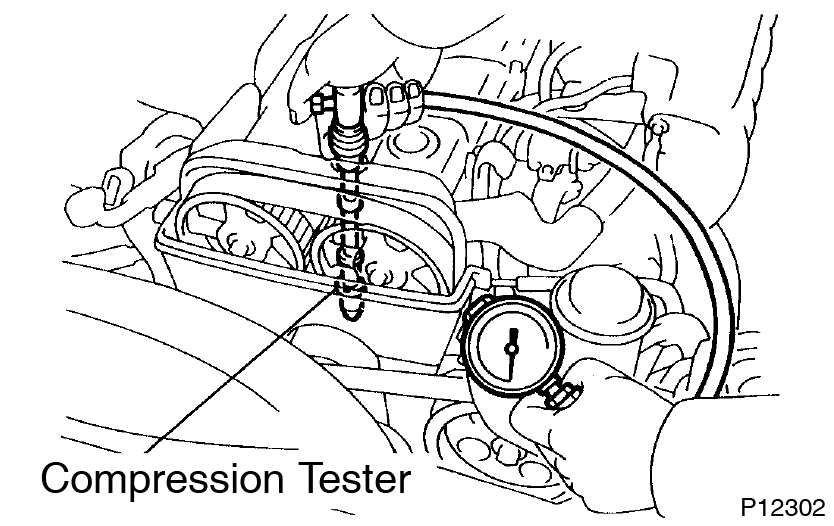- Introduction
- Maintenance
- Preparation
- Service specifications
- Diagnostics
- 2JZ-GE Engine
- 2JZ-GTE Engine
- 2JZ-GTE Turbocharging
- 2JZ-GE Emission control
- 2JZ-GTE Emission control
- 2JZ-GE SFI
- 2JZ-GTE SFI
- Cooling
- Lubrication
- Ignition system 2JZ-GE
- Ignition system 2JZ-GTE
- Starting system
- Charging system
- Clutch
- W58 manual transmission
- V160 manual transmission
- A340E 2JZ-GE automatic transmission
- A340E 2JZ-GTE automatic transmission
- Propeller shaft
- Suspension and axle
- Brake system
- Steering
- Supplemental restraint system
- Body electrical system
- Body
- Air conditioning system
- Warm up and stop engine
Allow the engine to warm up to normal operating temperature. - Disconnect camshaft position sensor connectors
- Remove ignition coils assemblies (See page IG-6 )
- Remove spark plugs
- Check cylinder compression

- Insert a compression tester into the spark plug hole.
- While cranking the engine, measure the compression pressure.
Always use a fully charged battery to obtain engine revolutions of 250 rpm or more. - Repeat steps (a) through (b) for each cylinder. This measurement must be done in as short a time as possible.Standard pressure:
1,079 kPa (11.0 kgf/cm2 , 156 psi) or more
Minimum pressure:
883 kPa (9.0 kgf/cm2 , 128 psi)
Difference between each cylinder:
98 kPa (1.0 kgf/cm2 , 14 psi) or less - If the cylinder compression in 1 or more cylinders is low, pour a small amount of engine oil into the cylinder through the spark plug hole and repeat steps (a) through (b) for the cylinder with low compression.
- If adding oil helps the compression, it is likely that the piston rings and/or cylinder bore are probably worn or damaged.
- If pressure stays low, a valve may be sticking or seating improper, or there may be leakage past the gasket.
- Reinstall spark plugs
- Reinstall ignition coils assemblies (See page IG-7 )
- Reconnect camshaft position sensor connectors




